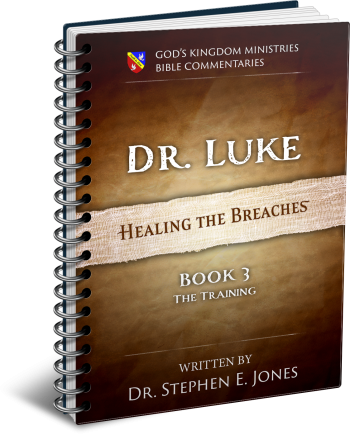Latest Posts
View the latest posts in an easy-to-read list format, with filtering options.

This book covers Luke 7-9, expounding on the main teachings of Jesus as He trained His disciples. It climaxes with His Transfiguration, which is a prophetic picture of the manifestation of the Sons of God at the end of the Age.
Category - Bible Commentaries

While Jesus was dealing with the demoniac in Caesarea Philippi (and with the crowd itself), Jesus told His disciples to watch these events, because they were prophetic. However, He did not want the crowd to know what He was saying, and so He spoke in code. Luke 9:43-45 says,
43 And they were all amazed at the greatness of God. But while everyone was marveling at all that He was doing, He said to His disciples, 44 “Let these words sink into your ears; for the Son of Man is going to be delivered into the hands of men.” 45 But they did not understand this statement, and it was concealed from them so that they might not perceive it; and they were afraid to ask Him about this statement.
Mark 9:31 gives a more detailed account, saying,
31 … The Son of Man is to be delivered into the hands of men, and they will kill Him; and when He has been killed, He will rise three days later.
Keep in mind that it had been only a week since Jesus first revealed that He was going to die and be raised again (Luke 9:22). The disciples must have found this revelation to be beyond belief. So Jesus reminds them of this. While Jesus was on the mount, they probably forgot about it while ministering to the people of Caesarea Philippi.
Jesus reminded the three disciples of this on the return trip to Caesarea Philippi, for Jesus told them in Matt. 17:9, “Tell the vision to no one until the Son of Man has risen from the dead.” He then told them that John the Baptist was the fulfillment of the “Elijah” prophecy, and compared John’s death with His own (Matt. 17:12).
The other nine disciples, however, were not privy to this conversation. When Jesus, Peter, James, and John returned to the city, there was no time to explain these events. They were immediately caught up in the situation of the demoniac. Yet it was during this event that Jesus spoke in code to the disciples, reminding them that He was “going to be delivered into the hands of men.” The clear explanation in Mark 9:31 was probably the way Jesus explained it to them later in private. Certainly, He would not have said this while the crowd was present, for this was a private revelation.
Why did Jesus say this to His disciples? Was the crowd just one big distraction? Was Jesus’ mind on more important matters? And did their location at Caesarea Philippi have anything to do with it?
First of all, the glory of transfiguration must be linked to His death on the cross. As we have noted in the two works of Christ, prophesied in the law, the first bird and goat were to be killed before the second bird and goat could come into glory. Jesus never lost sight of this, for He knew that the path to glory led through the valley of the shadow of death. This would soon be the lesson for the disciples themselves to learn, as we will see.
Recall that Caesarea Philippi was the old city of Dan, where one of the golden calves had been enshrined in ancient times. The nearby Grotto of Pan, or Panea, was known to the Jews as “the gates of hell.” Pan was the Azazel of Lev. 16:8 (incorrectly translated “scapegoat”). This half-man, half-goat pictured the devil, as I have already explained in the story of Jesus’ baptism and temptation in the wilderness.
Hence, Jesus’ trip to Caesarea Philippi was designed to deal with “the gates of hell” in a prophetic manner. It prefigured not only His death but also His glorification and victory through resurrection, ascension, and glorification.
When Jesus returned from Mount Hermon to Caesarea Philippi, the events shed light on the work that the overcomers will do in the Tabernacles Age to come. Their first work will be to deliver men from the unclean spirit of Caesarea Philippi—the spirit that was empowered by Jeroboam, when he established the rule of the golden calf over Israel (1 Kings 12:29).
It appears to me that this is why the nine disciples were unable to cast out this spirit and why “this kind cannot come out by anything but prayer” (Mark 9:29). It requires specific revelation to know how to deal with “this kind.”
I believe “this kind” is a demonic prince over a nation—in this case, Israel—who has been granted its authoritative position by the king or ruler (Jeroboam). In such cases, ordinary believers do not have the authority to dislodge it or command it in any way, because its dominion was established in a lawful manner by the political leader. To deal with “this kind,” one must either be the ruler of the nation (equal to the authority of Jeroboam) or one must go into prayer to seek authorization from God Himself.
Jesus, of course, had no trouble taking authority over this ruling spirit, for He was indeed the King of Israel—and more than a king. But the nine disciples discovered that it would not obey them, for it was not subject to them. Further, when we view this prophetically, we see that the nine disciples represented the church that had remained on earth while the overcomers (the three) had gone to Mount Sion (heaven) to be presented to the Father as the Sons of God.
This prophesies of the manifestation of the Sons of God. It is not only about Jesus Himself being manifested as the Son of God, but also of the overcomers who will also be manifested as Sons of God by the same pattern. Hence, after their Father officially pronounces them as His Sons, fulfilling the feast of Tabernacles, they will return to earth and overthrow the spirit of Pan. The gates of hell will not prevail (Matt. 16:18).
The incident of the demoniac at Caesarea Philippi, then, prophesies of an extraordinary time yet to come.
During the trip back to Capernaum, the disciples disputed among themselves about who was to be the greatest in the kingdom (Mark 9:33). This provided Jesus with another opportunity to teach the disciples privately.
The nine disciples were unable to cast out the unclean spirit in the young man (Luke 9:40), because they lacked authority over it. Jesus cast it out, but this brought about the disciples’ discussion as they began to argue over authority. Luke 9:46 says,
46 And an argument arose among them as to which of them might be the greatest.
Perhaps Peter, James, and John thought that if they had been there to cast out the unclean spirit, they would have succeeded, where the other nine disciples had failed. They claimed to be greater than the others, because Jesus had taken them up the Mount, leaving the other nine behind. But such arguments only showed their spiritual immaturity. Likewise, in applying this to ourselves, the lesson here is that prospective overcomers ought not to engage in the same kind of argument with other believers. All should exercise whatever authority has been given to them for the benefit of others.
Mark 9:33-37 gives more details, telling us also that this discussion took place on the road back to Capernaum. Jesus said nothing until they arrived at their destination and then asked them “What were you discussing on the way?” The disciples were somewhat embarrassed, because they did not want Jesus to know their topic. Mark 9:34 says,
34 But they kept silent, for on the way they had discussed with one another which of them was the greatest.
But Jesus already knew what they had been discussing. Mark 9:35-37 says,
35 And sitting down, He called the twelve and said to them, “If anyone wants to be first, he shall be last of all, and servant of all.” 36 And taking a child, He set him before them, and taking him in His arms, He said to them, 37 Whoever receives one child like this in My name receives Me; and whoever receives Me does not receive Me, but Him who sent Me.”
Luke 9:47, 48 adds little to this, saying,
47 But Jesus, knowing what they were thinking in their heart, took a child and stood him by His side, 48 and said to them, “Whoever receives this child in My name receives Me; and whoever receives Me receives Him who sent Me; for he who is least among you, this is the one who is great.”
Matt. 18:1-10 gives the most complete account of Jesus’ teaching on the subject. It appears that Jesus was the first to raise the question, at which time the disciples were silent. But then someone spoke up and confessed their topic, asking Jesus to resolve the dispute. And so Matt. 18:1 tells us that the disciples asked Jesus “Who then is greatest in the kingdom of heaven.” Jesus’ primary answer is in Matt. 18:3-5,
3 … “Truly I say to you, unless you are converted and become like children, you shall not enter the kingdom of heaven. 4 Whoever then humbles himself as this child, he is the greatest in the kingdom of heaven. 5 And whoever receives one such child in My name receives Me.”
If we put these lessons together into a more complete picture, we see that the child was a picture of humility, one who had no authority in the family. To “receive” such a child was to adopt that child’s humble position, not asserting any rights, but seeking to serve. This is the opposite of ambition, where men seek authority in the world in order to obtain parental authority over others.
This simple advice is one of the marks of the overcomers. Overcomers serve all others, for they see Christ in them and want to serve Christ. Our success in this area determines whether or not we are overcomers.